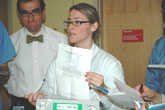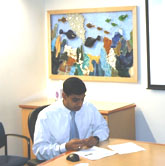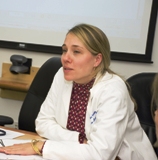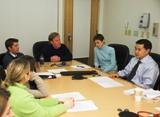Curriculum | Overview
First Year
 The first year is designed to expose the fellow to the full range of critically ill patients. Four months are spent in the Medical-Surgical Intensive Care Unit and two months are spent in the Cardiac Intensive Care Unit. Additional time in the first year is spent on rotations in Anesthesia (three months) and the Medicine Intensive Care Unit at Boston Children's Hospital (half month rotation). The remaining two and one half months are spent establishing a research project and twenty working days are provided for vacation. If a fellow wishes to do another clinical elective during the first year, this is also an option. Up to five work days may be used annually for attendance at a scientific meeting.
The first year is designed to expose the fellow to the full range of critically ill patients. Four months are spent in the Medical-Surgical Intensive Care Unit and two months are spent in the Cardiac Intensive Care Unit. Additional time in the first year is spent on rotations in Anesthesia (three months) and the Medicine Intensive Care Unit at Boston Children's Hospital (half month rotation). The remaining two and one half months are spent establishing a research project and twenty working days are provided for vacation. If a fellow wishes to do another clinical elective during the first year, this is also an option. Up to five work days may be used annually for attendance at a scientific meeting.
In addition to the rotations listed above, fellows are also expected to attend PALS training in order to become PALS certified. This should occur as early in the first year as possible. Fellows are also asked to complete online modules as assigned and participate in didactic teaching conferences as often as possible.
Second Year
 The second year of the fellowship is designed to provide ongoing clinical experience while extensive research exposure is obtained. At present, this amounts to four to five clinical rotations per year with the remainder as protected research time. In addition to rotations in the MSICU, CICU, and MICU, fellows may choose to do elective clinical time in the Adult Surgical ICU at the nearby Beth Israel-Deaconess Medical Center.
The second year of the fellowship is designed to provide ongoing clinical experience while extensive research exposure is obtained. At present, this amounts to four to five clinical rotations per year with the remainder as protected research time. In addition to rotations in the MSICU, CICU, and MICU, fellows may choose to do elective clinical time in the Adult Surgical ICU at the nearby Beth Israel-Deaconess Medical Center.
This is an academically oriented fellowship and contributions to the advancement of Critical Care Medicine are expected of each fellow. Current research activities range from the scholarly delineation of ethical issues to clinical trials to laboratory investigations of genetic susceptibility to disease, pulmonary hypertension, and Gram-negative lung infections. Fellows are expected to present their research locally and nationally. Each year fellows are allowed 5 meeting days in order to participate in academic meetings, with financial reimbursement for the cost of attending.
Third Year
 The third year curriculum is designed to provide additional ongoing clinical experience while further research experience is obtained. This currently amounts to about four months of clinical rotations with the remaining time reserved for research. Each year fellows are allowed 5 meeting days in order to participate in academic meetings, with financial reimbursement for the cost of attending.
The third year curriculum is designed to provide additional ongoing clinical experience while further research experience is obtained. This currently amounts to about four months of clinical rotations with the remaining time reserved for research. Each year fellows are allowed 5 meeting days in order to participate in academic meetings, with financial reimbursement for the cost of attending.
As fellows progress satisfactorily through their second and third years of training, they assume progressively more responsibility and autonomy for guiding work rounds and monitoring the function of the unit throughout the day. Additionally, third year fellows are also expected to supervise residents and medical students under the continued guidance of the critical care attending physician.
Conferences
 Core didactic teaching of the critical care curriculum by faculty occurs during five morning lectures each day from 7:15-8:15 a.m. Members of the faculty provide additional conferences, designed especially for the critical care fellows, every Monday, Wednesday, and Thursday. The subject matter of these conferences include research, morbidity and mortality, transport medicine, neurocritical care, surgical critical care and respiratory medicine. CICU bedside teaching rounds are held monthly with Dr. Peter Laussen, Chief of the Division of Cardiovascular Intensive Care. Topics of current fellow's research are addressed in a monthly "Works in Progress" session, which is developed and presented by a fellow. In addition, there is also a monthly Evidence Based Medicine conference, which is led by a fellow in close collaboration with Dr. Adrienne Randolph, one of the leading experts in the field. Finally, every Monday afternoon is the Fellows' Reading Colloquium. With the guidance of Dr. Jeffrey Burns and Dr. Gregory Priebe, the fellows discuss articles that have been carefully chosen to provide a solid foundation in physiology as well as medical and surgical topics specifically related to critical care medicine.
Core didactic teaching of the critical care curriculum by faculty occurs during five morning lectures each day from 7:15-8:15 a.m. Members of the faculty provide additional conferences, designed especially for the critical care fellows, every Monday, Wednesday, and Thursday. The subject matter of these conferences include research, morbidity and mortality, transport medicine, neurocritical care, surgical critical care and respiratory medicine. CICU bedside teaching rounds are held monthly with Dr. Peter Laussen, Chief of the Division of Cardiovascular Intensive Care. Topics of current fellow's research are addressed in a monthly "Works in Progress" session, which is developed and presented by a fellow. In addition, there is also a monthly Evidence Based Medicine conference, which is led by a fellow in close collaboration with Dr. Adrienne Randolph, one of the leading experts in the field. Finally, every Monday afternoon is the Fellows' Reading Colloquium. With the guidance of Dr. Jeffrey Burns and Dr. Gregory Priebe, the fellows discuss articles that have been carefully chosen to provide a solid foundation in physiology as well as medical and surgical topics specifically related to critical care medicine.
